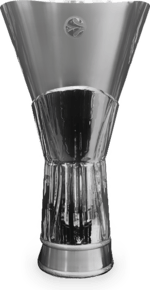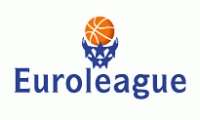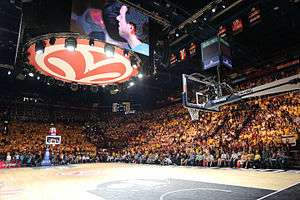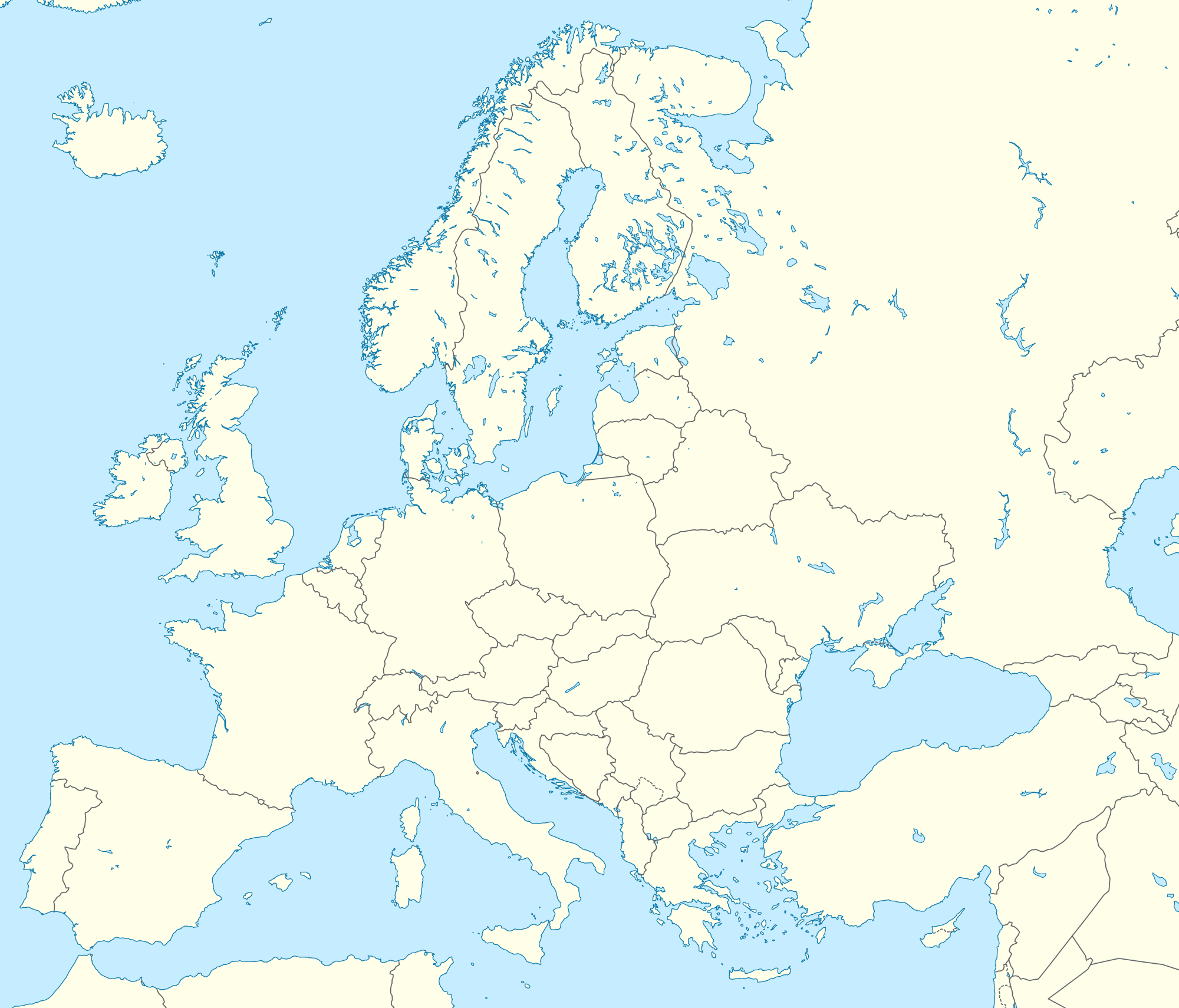EuroLeague
The EuroLeague, known as the Turkish Airlines EuroLeague for sponsorship reasons, is the top-tier European professional basketball club competition, organized by Euroleague Basketball since 2000.
 | |
| Founded | FIBA era 14 December 1957[1] Euroleague Basketball era 9 June 2000[2] |
|---|---|
| First season | FIBA era 1958 Euroleague Basketball era 2000–01 |
| Region | Europe |
| Confederation | FIBA Europe |
| Number of teams | 18 |
| Current champions | (8th title) |
| Most championships | (10 titles) |
| TV partners | List of broadcasters |
| Website | Official website |
Introduced in 2000, the competition replaced the FIBA EuroLeague (which was previously called the FIBA European Champions Cup, or simply the European Cup), which had been run by FIBA since 1958. The FIBA European Champions Cup and the EuroLeague are considered to be the same competition, with the change of name being simply a re-branding.
The EuroLeague is one of the most popular indoor sports leagues in the world, with an average attendance of 8,780 for league matches in the 2017–18 season. That was the fifth-highest of any professional indoor sports league in the world (the highest outside the United States), and the second-highest of any professional basketball league in the world, only behind the National Basketball Association (NBA).
The EuroLeague title has been won by 21 different clubs, 13 of which have won the title more than once. The most successful club in the competition is Real Madrid, with ten titles. The current champions are CSKA Moscow, who defeated Anadolu Efes in the 2019 final, winning the club's eighth title.
History
The FIBA European Champions Cup was originally established by FIBA and it operated under its umbrella from 1958 until the summer of 2000, concluding with the 1999–00 season. That was when Euroleague Basketball was created.

FIBA had never trademarked the "EuroLeague" name, even though it had used that name for the competition since 1996. Euroleague Basketball simply appropriated the name, and since FIBA had no legal recourse to do anything about it, it was forced to find a new name for its championship series. Thus, the following 2000–2001 season started with two separate top European professional club basketball competitions: the FIBA SuproLeague (previously known as the FIBA EuroLeague) and the brand new Euroleague 2000–01 season.
The rift in European professional club basketball initially showed no signs of letting up. Top clubs were also split between the two leagues: Panathinaikos, Maccabi Elite Tel Aviv, CSKA Moscow and Efes Pilsen stayed with FIBA, while Olympiacos, Kinder Bologna, Real Madrid Teka, FC Barcelona, Paf Wennington Bologna, Benetton Treviso, AEK and Tau Cerámica joined Euroleague Basketball.
In May 2001, Europe had two continental champions, Maccabi of the FIBA SuproLeague and Kinder Bologna of the Euroleague. The leaders of both organizations realized the need to come up with a unified competition. Although only a year old, Euroleague Basketball negotiated from a position of strength and dictated proceedings. FIBA essentially had no choice but to agree to Euroleague Basketball's terms. As a result, European club competition was fully integrated under Euroleague Basketball's umbrella and teams that competed in the FIBA SuproLeague during the 2000–01 season joined it as well.
In essence, the authority in European professional basketball was divided over club-country lines. FIBA stayed in charge of national team competitions (like the FIBA EuroBasket, the FIBA World Cup, and the Summer Olympics), while Euroleague Basketball took over the European professional club competitions. From that point on, FIBA's Korać Cup and Saporta Cup competitions lasted only one more season before folding, which was when Euroleague Basketball launched the ULEB Cup, now known as the EuroCup.
League era
In November 2015, Euroleague Basketball and IMG agreed on 10-year joint venture. Both Euroleague Basketball and IMG will manage the commercial operation, and the management of all global rights covering both media and marketing.[3] The deal was worth €630 million guaranteed over 10 years, with projected revenues reaching €900 million.[4] Along with the deal the league changed into a true league format, with 16 teams playing each other team in the regular season followed by the playoffs. The A-licensed club were assured of participation for the following ten years in the new format. After the new format of the EuroLeague and FIBA implementing national team windows, a conflict between the two organizations emerged. EuroLeague has been criticised by FIBA as well as several national federations for creating a 'closed league' and ignoring the principle of meritocracy. In July 2019, EuroLeague announced that from the 2019–20 season there will be no direct assess to the league through domestic leagues anymore.[5]
Title sponsorship
On 26 July 2010, Turkish Airlines and Euroleague Basketball announced a €15 million strategic agreement to sponsor the top European basketball competition across the globe. According to the agreement, starting with the 2010–11 season, the top European competition would be named Turkish Airlines Euroleague Basketball. Similarly, the EuroLeague Final Four would be named the Turkish Airlines EuroLeague Final Four, whereby the new league title would appear in all media accordingly. This title partnership was set to run for five seasons, with the option of extending it to an additional five.[6][7] On 23 October 2013, Turkish Airlines and Euroleague Basketball agreed to extend their partnership, up until 2020.[8]
Names of the competition
- FIBA era: (1958–2001)
- FIBA European Champions Cup: (1958–1991)
- FIBA European League ("FIBA Euro League"): (1991–1996)
- FIBA EuroLeague: (1996–2000)[9]
- FIBA SuproLeague: (2000–2001)
- Euroleague Basketball era: (2000–present)
- Euroleague: (2000–2016)
- EuroLeague: (2016–present)
*There were two separate competitions during the 2000–01 season. The SuproLeague, which was organized by FIBA, and the Euroleague, which was organized by Euroleague Basketball.
Competition systems
Tournament systems
The EuroLeague operated under a tournament system, from its inaugural 1958 season, through the 2015–16 season.
- FIBA European Champions Cup (1958 to 1986–87): The champions of European national domestic leagues, and the then current European Champions Cup title holders (except for the 1986–87 season), competing against each other, played in a tournament system. The league culminated with either a single game final, or a 2-game aggregate score finals (3 games if needed to break a tie).
- FIBA European Champions Cup (1987–88 to 1990–91): The champions of European national domestic leagues, competing against each other, played in a tournament system. The league culminated with a Final Four.
- FIBA European League (1991–92 to 1995–96): The champions of the European national domestic leagues, the then current European League title holders, along with some of the other biggest teams from the most important national domestic leagues, played in a tournament system. The league culminated with a Final Four.
- FIBA EuroLeague (1996–97 to 1999–00): The champions of the best European national domestic leagues, along with some of the other biggest teams from the most important national domestic leagues, played in a tournament system. The league culminated with a Final Four.
- *Euroleague (2000–01): Some of the European national domestic league champions, and some of the runners-up from various national domestic leagues, played in a tournament system. The league culminated with a best of 5 playoff finals.
- *FIBA SuproLeague (2000–01): Some of the European national domestic league champions, and some of the runners-up from various national domestic leagues, played in a tournament system. The league culminated with a Final Four.
- Euroleague (2001–02 to 2015–16): The champions of the best European national domestic leagues, along with some of the other biggest teams from the most important national domestic leagues, played in a tournament system. The league culminated with a Final Four.
*There were two separate competitions during the 2000–01 season. The SuproLeague, which was organized by FIBA, and the Euroleague, which was organized by Euroleague Basketball.
League system
Starting with the 2016–17 season, the EuroLeague operates under a league format.
- EuroLeague (2016–17 to present): The champions of the best European national domestic leagues, along with some of the other biggest teams from the most important national domestic leagues, playing in a true European-wide league system format. The league culminates with a Final Four.
Logos
| Evolution of the EuroLeague logo | ||||||||
|---|---|---|---|---|---|---|---|---|
| 2000–2005 | 2005–2010 | 2010–2016 | 2016–present | |||||
 |
 |
 |
 | |||||
Format

Starting with the 2016–17 season, the EuroLeague is made up of 18 teams, which each play each other twice, once at home and once away, in a double round robin league regular season, each team playing 34 games.
The top 8 placed teams at the end of the regular season advance to playoffs, each playing a 5 game playoff series against a single opponent. The regular season standings are used to determine which teams play each other, and in each pairing the higher placed team has home-court advantage in the series, playing 3 of the 5 games at home. The winners of each of the four playoff series advance to the Final Four, held at a predetermined site. The Final Four features two semifinals, a third place game, and the championship game, all on the same weekend.
Each team plays a maximum 40 games per season: 34 in the regular season, a maximum of 5 during the playoffs, and 2 in the Final Four.
Qualification
Currently, 11 out of the 18 EuroLeague places are held by licensed clubs that have long-term licenses with Euroleague Basketball, and are members of the Shareholders Executive Board. These eleven licensed clubs are currently:
|
The remaining 7 EuroLeague places are held by 5 associated clubs that have annual licences and 2 two-year wild cards. The five associated clubs are awarded through one place going to the winner of the previous season's 2nd-tier European competition, the EuroCup, with the other four places going to a combination of European national domestic league winners (ABA League, VTB United League, Basketball Bundesliga, Liga ACB).
Previous EuroLeague formats
European national domestic league and club rankings
Arena standards
Effective as of the 2012–13 season, EuroLeague clubs with what was at the time an "A License" had to host their home EuroLeague games in arenas that have a seating capacity of at least 10,000 people. This same minimum 10,000 seat arena capacity rule, now currently applies to all EuroLeague clubs with a long-term license.
Previously, in 2008, the Euroleague Basketball had originally decided to increase the minimum arena seating requirement to 10,000, within four years time, in order to force EuroLeague clubs to move into and/or build bigger arenas. This was done in hopes of increasing revenues through more ticket sales. Conversely, associated clubs, must currently play in arenas that seat at least 5,000 people.
Current clubs
These are the teams that participate in the 2019–20 EuroLeague season:

| Team | Home city | Arena | Capacity |
|---|---|---|---|
| Berlin | Mercedes-Benz Arena | 14,500[10] | |
| Istanbul | Sinan Erdem Dome | 16,000[11] | |
| Milan | Mediolanum Forum | 12,700[12] | |
| Allianz Cloud | 5,420 | ||
| Barcelona | Palau Blaugrana | 7,585[13] | |
| Munich | Audi Dome | 6,700[14] | |
| Belgrade | Štark Arena | 18,386[15] | |
| Aleksandar Nikolić Hall | 8,000[16] | ||
| Moscow | Megasport Arena | 13,344[17] | |
| Istanbul | Ülker Sports and Event Hall | 13,059[18] | |
| Khimki | Mytishchi Arena | 7,280 | |
| Vitoria-Gasteiz | Buesa Arena | 15,504[19] | |
| Villeurbanne | Astroballe | 5,556[20] | |
| Tel Aviv | Menora Mivtachim Arena | 10,383[21] | |
| Piraeus | Peace and Friendship Stadium | 11,640[22] | |
| Athens | O.A.K.A. | 18,989[23] | |
| Madrid | WiZink Center | 15,000[24] | |
| Valencia | La Fonteta | 9,000[25] | |
| Kaunas | Žalgirio Arena | 15,415[26] | |
| Saint Petersburg | Sibur Arena | 7,120[27] |
Results
Finals
Titles by club
Titles by nation
| Rank | Country | Club | Titles | Runners-up |
|---|---|---|---|---|
| 1. | Real Madrid | 10 | 8 | |
| FC Barcelona | 2 | 5 | ||
| Joventut Badalona | 1 | 1 | ||
| Baskonia | – | 2 | ||
| 4 clubs | 13 | 16 | ||
| 2. | ||||
| Varese | 5 | 5 | ||
| Olimpia Milano | 3 | 2 | ||
| Virtus Bologna | 2 | 3 | ||
| Cantù | 2 | – | ||
| Virtus Roma | 1 | – | ||
| Treviso | – | 2 | ||
| Fortitudo Bologna | – | 1 | ||
| 7 clubs | 13 | 13 | ||
| 3. | Panathinaikos | 6 | 1 | |
| Olympiacos | 3 | 5 | ||
| AEK | – | 1 | ||
| 3 clubs | 9 | 7 | ||
| 4. | CSKA Moscow | 4 | 3 | |
| Rīgas ASK | 3 | 1 | ||
| Dinamo Tbilisi | 1 | 1 | ||
| Žalgiris | – | 1 | ||
| 4 clubs | 8 | 6 | ||
| 5. | Split | 3 | 1 | |
| Cibona | 2 | – | ||
| Bosna | 1 | – | ||
| Partizan | 1 | – | ||
| 4 clubs | 7 | 1 | ||
| 6. | Maccabi Tel Aviv | 6 | 9 | |
| 7. | CSKA Moscow | 4 | 3 | |
| 8. | Fenerbahçe | 1 | 2 | |
| Anadolu Efes | – | 1 | ||
| 2 clubs | 1 | 3 | ||
| 9. | Limoges CSP | 1 | – | |
| – | Žalgiris | 1 | – | |
| 11. | Brno | – | 2 | |
| USK Praha | – | 1 | ||
| 2 clubs | 0 | 3 | ||
| 12. | Academic | – | 2 | |
Records
- Real Madrid has been the most successful team, having won the competition a record ten times.[28]
- Split (1988–89, 1989–90, 1990–91), is the only team to have won the competition three times in a row, in the modern EuroLeague Final Four era (1987–88 season to present).
- Rīgas ASK, as a Soviet League club in the late 1950s and early 1960s (1958, 1958–59, 1959–60), is the only team to have won the competition three times in a row, in the pre-EuroLeague Final Four era.
- Real Madrid (1963–64, 1964–65) & (1966–67, 1967–68), along with Varese (1971–72, 1972–73) & (1974–75, 1975–76), are the only teams to have won the European Championship twice in a row, on two separate occasions, in the pre-modern EuroLeague Final Four era.
- Cantù (1981–82, 1982–83), Cibona (1984–85, 1985–86), and Olimpia Milano (1986–87, 1987–88), are the other three teams to have won the European Championship twice in a row (only for one time), in the pre-modern EuroLeague Final Four era.
- Maccabi Tel Aviv (2003–04, 2004–05), and Olympiacos (2011–12, 2012–13), are the only teams to have won the EuroLeague twice in a row, becoming back-to-back EuroLeague champions in the Euroleague Basketball era (2000–01 season to present).
- Fenerbahçe are the only team who stayed undefeated at home after a 30-game regular season and secured the best record after a regular season (25-5) under the new format (2016–17 season to present). They are also the earliest EuroLeague Playoffs qualifiers ever in the modern EuroLeague era.[29]
- Istanbul is the only city from which nine different clubs have played in the competition: Beşiktaş, Darüşşafaka, Eczacıbaşı, Efes, Fenerbahçe, Galatasaray, Istanbul Technical University, Modaspor, and Ülker have participated in the EuroLeague.
- Although Israel is located in the Middle East, its teams play in the EuroLeague, as its national federation is a member of FIBA Europe and its top professional league is a member of ULEB. (Similarly, the Israel Football Association is a member of UEFA, enabling its national team and clubs to play in UEFA competitions.)
- In a small area of less than 40 km² (25 mi²), north of Milan, there are 3 clubs that have won a total of 10 FIBA European Champions' Cups, and played in a total of 16 finals: Pallacanestro Varese (5), Olimpia Milano (3) and Cantù (2).
- The record score differential for a EuroLeague Finals game was achieved at the 2004 Finals, in Tel Aviv, where the home club, Maccabi Elite, defeated Skipper Bologna, by a score of 118–74 (a 44-point difference).
- A crowd of 22,567, which filled Belgrade Arena on 5 March 2009, for a 2008–09 season Top 16 game between Partizan and Panathinaikos is the league's official all seated attendance record.[30] Before that, a crowd of 18,500 all seated fans occurred at a Panathinaikos home game at the Olympic Indoor Hall, in Athens, against Tau Cerámica, on 12 April 2006, during the 2005–06 third quarterfinal playoff game.
- The most points ever scored in a single game by an individual in the league is 99 points, by Radivoj Korać of OKK Beograd, on January 14, 1965, during the 1964–65 season, in a game against Alvik.[31]
- The most points ever scored in a single EuroLeague Finals game by an individual is 47 points, in the 1978–79 season, by Žarko Varajić of Bosna, in a game against Emerson Varese, on April 5, 1979.[32]
EuroLeague awards
Statistical leaders
All-time leaders
Since the beginning of the 2000–01 season (Euroleague Basketball era):
Individual performances
EuroLeague versus NBA games
Attendances
Season averages
All averages include playoffs and Final Four games.
| Season | Total gate | Games | Average | Change | High avg. | Team | Low avg. | Team |
|---|---|---|---|---|---|---|---|---|
| 2008–09 | 1,263,578 | 188 | 6,721 | 11,770 | 2,460 | |||
| 2009–10 | 1,182,046 | 186 | 6,355 | –5.4% | 11,188 | 1,440 | ||
| 2010–11 | 1,383,449 | 185 | 7,478 | +17.7% | 13,926 | 3,180 | ||
| 2011–12 | 1,305,215 | 178 | 7,333 | –1.9% | 13,107 | 3,283 | ||
| 2012–13 | 1,867,145 | 253 | 7,366 | +0.5% | 13,425 | 3,110 | ||
| 2013–14 | 2,063,600 | 248 | 8,130 | +10.4% | 12,578 | 3,960 | ||
| 2014–15 | 2,013,305 | 251 | 8,184 | +0.1% | 14,483 | 1,949 | ||
| 2015–16 | 1,832,920 | 250 | 7,332 | –10.4% | 11,060 | 2,809 | ||
| 2016–17 | 2,194,238 | 259 | 8,472 | +5.4% | 11,633 | 3,734 | ||
| 2017–18 | 2,282,297 | 260 | 8,780 | +3.6% | 13,560 | 3,900 | ||
| 2018–19 | 2,153,445 | 260 | 8,282 | –6.0% | 14,808 | 2,691 | ||
| 2019–20 | 2,138,504 | 222[lower-alpha 1] | 8,588 | +3.7% | 14,221 | 4,299 |
- Season was curtailed due to the COVID-19 pandemic. Four games, for different reasons, were played under closed doors and are not included in this table.
Historic average attendances
This list shows the averages attendances of each team since the 16-team regular season was established in 2016. All averages include playoffs games.
| Season | ALB | EFS | ASV | BAM | BAR | BKN | BAY | BUD | CZV | CSK | DSK | FNB | GAL | GCA | KHI | MTA | MGA | MIL | OLY | PAO | RMA | UNK | VAL | ZAL | ZEN |
|---|---|---|---|---|---|---|---|---|---|---|---|---|---|---|---|---|---|---|---|---|---|---|---|---|---|
| 2016–17 | 5,320 | 6,415 | 4,931 | 11,633 | 9,818 | 8,293 | 4,677 | 11,219 | 4,806 | 10,888 | 9,483 | 9,360 | 11,172 | 10,312 | 3,734 | 11,418 | |||||||||
| 2017–18 | 3,900 | 6,188 | 5,679 | 11,351 | 6,277 | 8,211 | 11,566 | 6,022 | 10,731 | 7,272 | 7,472 | 8,913 | 13,005 | 10,030 | 6,753 | 13,560 | |||||||||
| 2018–19 | 8,247 | 5,793 | 11,138 | 4,349 | 4,792 | 7,198 | 2,691 | 10,737 | 4,823 | 5,502 | 10,522 | 8,493 | 8,203 | 12,530 | 9,792 | 14,808 | |||||||||
| 2019–20 | 9,930 | 13,113 | 5,326 | 5,977 | 10,661 | 4,688 | 11,744 | 7,050 | 9,862 | 5,189 | 10,038 | 8,491 | 7,287 | 9,858 | 9,649 | 7,433 | 14,221 | 4,299 |
Individual game highest attendance
| Rank | Home team | Score | Away team | Attendance | Arena | Date | Ref |
|---|---|---|---|---|---|---|---|
| 1 | 63–56 | 22,567 | Belgrade Arena | March 5, 2009 | |||
| 2 | 76–67 | 21,367 | Belgrade Arena | April 1, 2010 | |||
| 3 | 56–67 | 21,352 | Belgrade Arena | March 31, 2009 | |||
| 4 | 81–73 | 20,783 | Belgrade Arena | March 30, 2010 |
Note: Match between Panathinaikos and Barcelona on 18 April 2013, at OAKA Sports Center, was supposedly watched by about 30,000 spectators.[33] However, it is not included in the table as the official data is 18,300.[34]
Media coverage
The EuroLeague season is broadcast on television, and can be seen in up to 201 countries and territories.[35] It can be seen by up to 245 million (800 million via satellite) households weekly in China.[36]
It is also televised in the United States and Canada on NBA TV and available online through ESPN3 (in English) and ESPN Deportes (in Spanish) until 2017–18 season. From 2018–19 season, the coverage is moved to FloSports.[37]
The EuroLeague Final Four is broadcast on television in up to 213 countries and territories.[38] The EuroLeague also has its own internet pay TV service, called EuroLeague TV.
Sponsors
- Title sponsor
- Premium partners
- 7DAYS
- Adidas
- Tempobet (only in Germany)
- Fonbet (only in Russia)
- Nesine (only in Turkey)
- bwin (Greece and Spain)
|
|
See also
- 50 Greatest EuroLeague Contributors (2008)
- EuroLeague Awards
- EuroLeague Basketball 2001–10 All-Decade Team
- EuroLeague Basketball 2010–20 All-Decade Team
- EuroLeague Finals
- EuroLeague Final Four
- Euroleague Basketball Next Generation Tournament
- EuroLeague Women
- European Cup and EuroLeague records and statistics
- FIBA European Champions Cup and EuroLeague history
- FIBA EuroStars
- FIBA Festival
- Rosters of the top basketball teams in European club competitions
- NBA 2K14
References
- "Champions Cup 1958". linguasprt. Retrieved 22 March 2017.
- "ULEB History". ULEB. Retrieved 2 January 2017.
- "Euroleague Basketball A-licence clubs and IMG agree on 10-year joint venture". Euroleague Basketball. 10 November 2015.
- 630 millions guaranteed by IMG.
- "The EuroLeague changes in the summer of 2020". Eurohoops. 11 July 2019. Retrieved 1 October 2019.
- "Turkish Airlines And Euroleague Basketball Sign Strategic Partnership Agreememt" (Press release). Euroleague Basketball. 28 July 2010. Retrieved 29 July 2010.
- "An important strategic partnership agreement between Turkish Airlines and Euroleague Basketball..." (Press release). Turkish Airlines. 26 July 2010. Archived from the original on 16 July 2011. Retrieved 29 July 2010.
- "Turkish Airlines, Euroleague Basketball Cement Partnership Through 2020". turkishairlines.com. 23 October 2013. Retrieved 20 May 2015.
- THE EUROPEAN CUP FOR MEN'S CHAMPION CLUBS - THE EARLY YEARS
- Worldstadiums.com basketball capacity 14,500. Archived 6 October 2009 at the Wayback Machine
- Turkey2010.FIBA.com Mayor of Istanbul gives Turkish Basketball Federation and media tour of World Championship Final venue. Archived 2010-06-10 at the Wayback Machine
- "CHI SIAMO". MediolanumForum.it. Retrieved 3 December 2016.
- "Palau Blaugrana - FC Barcelona". FC Barcelona. Retrieved 4 June 2017.
- Rudi-Sedlmayer-Halle Archived 2011-06-24 at the Wayback Machine (in German)
- (in Russian)
- "Hala Aleksandar Nikolić". tasmajdan.rs. Retrieved 4 January 2019.
- "About Megasport {{in lang|ru}}". Archived from the original on 30 May 2019. Retrieved 30 March 2020.
- Venue Review: Fenerbahce Ulker Sports Arena.
- "Sports Competitions". buesa-arena.com. Archived from the original on 7 November 2016. Retrieved 6 November 2016.
- "0 ME,Astroballe (5556 places)" (in French). Archived from the original on 30 June 2017. Retrieved 30 September 2016.
- Attendance: 10,383.
- "Peace and Friendship Stadium - Olympiacos BC". olympiacosbc.gr. Archived from the original on 2 August 2016. Retrieved 4 June 2017.
- "Olympic Sports Hall". stadia.gr. Retrieved 29 June 2017.
- "WiZink Center | Real Madrid Basketball Arena | Real Madrid Basketball". Real Madrid. Retrieved 1 January 2017.
- "Pabellón: Pabellon Municipal Fuente San Luis (9.000 espectadores) {{in lang|es}}". Archived from the original on 10 August 2015. Retrieved 15 April 2019.
- "EuroLeague ticket sales to Zalgiris home games begin next week". Retrieved 8 September 2019.
- "ГЛАВНАЯ АРЕНА {{in lang|ru}}". Archived from the original on 28 March 2019. Retrieved 17 October 2019.
- Milosavljevic, Zoran (20 May 2018). "Real beat Fenerbahce to win 10th Euroleague title". Reuters. Retrieved 23 July 2018.
- "Sloukas lets Fenerbahce stay perfect at home". euroleague.net. Euroleague Basketball. Retrieved 5 April 2019.
- "Partizan sets crowd record at Belgrade Arena!". Euroleague.net. 5 March 2009. Retrieved 6 March 2009.
- Euroleague.net Radivoj Korac's 99 points.
- European club champions: 1958-2014.
- "30.000 κόσμος στο «κλειστό»!" (in Greek). Gazzeta. 18 April 2013.
- Panathinaikos Athens vs FC Barcelona Regal - Game
- Fenerbahce-Madrid Game of Week sets new TV reach record.
- "– CSPN China to broadcast Turkish Airlines Euroleague". Euroleague.net. 16 December 2010.
- "FloSports Acquires EuroLeague Basketball Rights in North America". FloSports. 7 May 2018. Retrieved 3 October 2019.
- Record broadcast reach for 2017 Final Four!
- "Global – Marketing Partners". Euroleague Basketball. Archived from the original on 7 November 2017. Retrieved 4 November 2017.
- "Germany – Marketing Partners". Euroleague Basketball. Archived from the original on 7 November 2017. Retrieved 4 November 2017.
- "Russia – Marketing Partners". Euroleague Basketball. Archived from the original on 7 November 2017. Retrieved 4 November 2017.
- "Turkey – Marketing Partners". Euroleague Basketball. Archived from the original on 7 November 2017. Retrieved 4 November 2017.
- "Spain – Marketing Partners". Euroleague Basketball. Archived from the original on 7 November 2017. Retrieved 4 November 2017.
- "Greece – Marketing Partners". Euroleague Basketball. Archived from the original on 7 November 2017. Retrieved 4 November 2017.